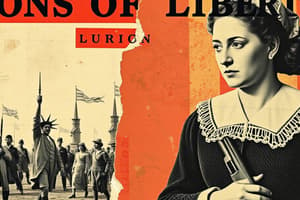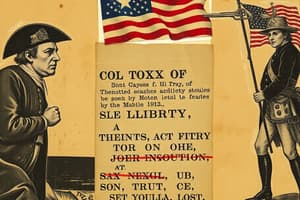Podcast
Questions and Answers
What was the name of the first tax imposed by Parliament on the colonies without their consent?
What was the name of the first tax imposed by Parliament on the colonies without their consent?
The Stamp Act
What was the purpose of the Sons of Liberty?
What was the purpose of the Sons of Liberty?
To promote the well-being of the colonies and fight for freedom from British rule.
Who were some of the founding members of the Sons of Liberty?
Who were some of the founding members of the Sons of Liberty?
Samuel Adams, John Hancock, and Benedict Arnold.
What was the Gaspee Affair?
What was the Gaspee Affair?
What event occurred yesterday, according to the text, that involved the dumping of tea into the ocean?
What event occurred yesterday, according to the text, that involved the dumping of tea into the ocean?
What year was the Stamp Act issued?
What year was the Stamp Act issued?
What was the name of the act that imposed a tax on tea?
What was the name of the act that imposed a tax on tea?
What was the name of the treaty that ended the American Revolution?
What was the name of the treaty that ended the American Revolution?
What was the main reason for the implementation of the Stamp Act in 1765?
What was the main reason for the implementation of the Stamp Act in 1765?
What specific items were taxed under the Stamp Act?
What specific items were taxed under the Stamp Act?
What was the Royal Proclamation of 1763 and how did it contribute to tensions between Britain and the colonies?
What was the Royal Proclamation of 1763 and how did it contribute to tensions between Britain and the colonies?
What was Pontiac's Rebellion and how did it impact British policy regarding the colonies?
What was Pontiac's Rebellion and how did it impact British policy regarding the colonies?
How did the Sugar Act differ from the Molasses Act of 1733?
How did the Sugar Act differ from the Molasses Act of 1733?
Explain the connection between the Seven Years' War, Pontiac's Rebellion, and the Stamp Act.
Explain the connection between the Seven Years' War, Pontiac's Rebellion, and the Stamp Act.
What was the estimated annual cost of maintaining a standing army of 10,000 British soldiers in the colonies?
What was the estimated annual cost of maintaining a standing army of 10,000 British soldiers in the colonies?
Why did the British Parliament decide that Americans should contribute to the cost of their own defense?
Why did the British Parliament decide that Americans should contribute to the cost of their own defense?
What was the primary purpose of the Sugar Act passed on April 5, 1764?
What was the primary purpose of the Sugar Act passed on April 5, 1764?
Who were the two key figures opposing the Sugar Act and what did they argue?
Who were the two key figures opposing the Sugar Act and what did they argue?
What actions did merchants take in response to the Sugar Act in 1764?
What actions did merchants take in response to the Sugar Act in 1764?
What was the outcome of the opposition against the Sugar Act by 1766?
What was the outcome of the opposition against the Sugar Act by 1766?
What event is referred to as the Boston Massacre and when did it occur?
What event is referred to as the Boston Massacre and when did it occur?
Who was Captain William Dalrymple and what was his role during the Boston Massacre?
Who was Captain William Dalrymple and what was his role during the Boston Massacre?
What events contributed to the agitation of the crowd during the Boston Massacre?
What events contributed to the agitation of the crowd during the Boston Massacre?
What motivated the crowd to confront the British soldiers during the Boston Massacre?
What motivated the crowd to confront the British soldiers during the Boston Massacre?
Flashcards
Stamp Act
Stamp Act
A tax imposed by the British Parliament on all colonial commercial and legal papers, newspapers, pamphlets, cards, almanacs, and dice.
Seven Years' War
Seven Years' War
A war between Britain and France, ending in 1763 with British victory and control of French lands east of the Mississippi River.
Pontiac's Rebellion
Pontiac's Rebellion
An event sparked by the British proclamation forbidding settlers from moving into newly acquired lands, leading to conflict with Native Americans.
Royal Proclamation of 1763
Royal Proclamation of 1763
Signup and view all the flashcards
Sugar Act
Sugar Act
Signup and view all the flashcards
Molasses Act
Molasses Act
Signup and view all the flashcards
Boycott
Boycott
Signup and view all the flashcards
Cost of British Army
Cost of British Army
Signup and view all the flashcards
The Sugar Act
The Sugar Act
Signup and view all the flashcards
Thirteen Colonies
Thirteen Colonies
Signup and view all the flashcards
Riots and Protests against the Sugar Act
Riots and Protests against the Sugar Act
Signup and view all the flashcards
Leaders of the Opposition
Leaders of the Opposition
Signup and view all the flashcards
Repeal of the Sugar Act
Repeal of the Sugar Act
Signup and view all the flashcards
British Soldiers in Boston
British Soldiers in Boston
Signup and view all the flashcards
The Boston Massacre
The Boston Massacre
Signup and view all the flashcards
The Stamp Act: First Tax on the Colonies
The Stamp Act: First Tax on the Colonies
Signup and view all the flashcards
What was the Stamp Act?
What was the Stamp Act?
Signup and view all the flashcards
Who were the Sons of Liberty?
Who were the Sons of Liberty?
Signup and view all the flashcards
What was the Boston Tea Party?
What was the Boston Tea Party?
Signup and view all the flashcards
What was the Gaspee Affair?
What was the Gaspee Affair?
Signup and view all the flashcards
What was tarring and feathering?
What was tarring and feathering?
Signup and view all the flashcards
What was the Tea Act?
What was the Tea Act?
Signup and view all the flashcards
What was the Treaty of Paris?
What was the Treaty of Paris?
Signup and view all the flashcards
What was the significance of Quebec?
What was the significance of Quebec?
Signup and view all the flashcards
Study Notes
Lead Up to the Revolution
- Various taxes imposed on the colonies by Great Britain (e.g., Sugar Act)
- Colonial opposition to these taxes and restrictions on trade
- Merchants protested the Sugar Act, leading boycotts of British goods
- Key figures in the opposition included James Otis and Samuel Adams
- Riots and protests in response to the Act
- The Sugar Act was repealed in 1766
Boston Massacre
- A crowd gathered outside a government building in Boston on March 5, 1770
- British soldiers were dispatched to control the crowd
- Conflict escalated with the throwing of stones and rocks
- Shots fired, resulting in 3 deaths and 8 injuries
- A trial followed with the soldiers being accused of manslaughter
- The outcome was controversial, with some acquitted and others convicted
The United Empire Loyalists
- Loyalists were American colonists who remained loyal to the British crown during the American Revolution
- Faced hardships, displacement, and property loss
- Fled to British territories, including Canada, Caribbean, Sierra Leone
- Led to the development of new provinces (e.g., Ontario) in Canada
The Quebec Act of 1774
- British government's decision to allow Quebec to follow French civil laws
- Allowed the collection of tithes by the Catholic Church
- Included land stretching from Rupert’s Land, the Eastern Sea, Eastern and Southern banks of Mississippi, and the Province of Quebec
- Settled the land disputes between the English and French settlers
- The colonial response was largely negative, dividing colonists and making British control more difficult
The Thirteen Colonies
- British colonies along the eastern coast of North America
- Variety of reasons for their founding including economic opportunity, religious freedom, and escaping persecution
- Significant figures like George Washington, Thomas Jefferson, and Benjamin Franklin emerged
The Royal Proclamation of 1763
- King George III declared land west of the colonies as Native American territory
- Made it so that it was forbidden for the colonists to settle there
- An attempt to control westward expansion and maintain peace with Native Americans
- The Proclamation was largely ignored by settlers, leading to conflict.
Constitutional Act of 1791
- Divided Quebec into Upper and Lower Canada (Ontario and Quebec)
- Established separate governments and administrations for each colony
- New laws introduced to resemble those from Great Britain.
- A response to the flow of loyalists after the American Revolution.
Stamp Act
- A tax on all printed materials in the colonies imposed by British Parliament
- Protests emerged, including the Boston Tea Party marking a turning point in American colonial relations.
- The British thought it was fair to tax the colonists because the colonies benefited from the cost of the standing army
- Colonists thought differently as they thought the tax was unfair
- Enraged the colonists.
The Sons of Liberty
- Organized groups of colonists who protested British policies
- Used tactics such as tarring and feathering, boycotts, and public demonstrations
- Led major events such as the Boston Tea Party
Treaty of Paris
- Concluded the American Revolutionary War in September 1783
- Established a boundary between the United States and British North America
- Included land reserved for Indigenous peoples.
The Boston Tea Party
- Colonial protest against the Tea Act of 1773
- Colonists, disguised as Native Americans, dumped tea into Boston Harbor
- Protest against British taxes without colonial representation.
Studying That Suits You
Use AI to generate personalized quizzes and flashcards to suit your learning preferences.




